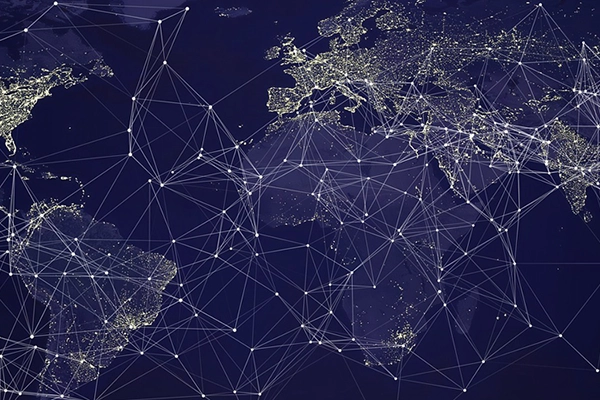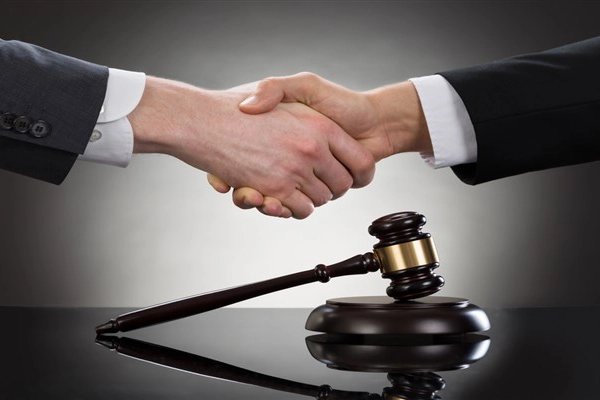Considerations On Governance Of Cyberspace: Does It Require A Different Form?
This article hereby is an approach concerning the growing awareness of the social, economic, and political impact of the Internet on society since it has brought the question of Internet governance into sharper focus. Thus it shall serve as a discussion if Cyberspace is different from real space and whether it requires a different form of governance.
Throughout the years the world thus technology has changed and improved, and we have achieved a lot. Therefore discussions on whether we need a different form of governance on matters concerning cyberspace have become necessary by virtue of the development of technology at great speed and pace.
As we look back over time, not that long ago, just about h30 years or so, no one owned a personal computer, or just a decade back, smartphones –that almost all of us are hooked on to nowadays- didn't even exist. The 'internet', which from a historical perspective is still relatively recent -it doesn't go back more than three decades-. Having said that, us being able to access it from almost any and every electronic device at any time has also brought a lot of conflicts along with it besides convenience it has brought. Aside from the contributions, the governance of it is a problem on its own: the harmful content and the dilemma of it, have given rise to disputes where interpretations with our settled legal rules have started to become inadequate. The Internet does not respect territories and have no boundaries.
Internet
It's safe to say that we consent to be governed1. And that the Internet started as a government project where it was originally designed for use by a closed circle, mainly of academics. Communication was open. Security was not a concern. "In the late 1960s, the US government sponsored the development of the ARPANet2, a network aimed to facilitate the sharing of digital resources among computers. By the mid‑1970s, with the invention of TCP/IP (Transmission Control Protocol/Internet Protocol), this network evolved into what is known today as the Internet."3
Ray Kurzweil states "Technology goes beyond mere tool making; it is a process of creating ever more powerful technology using the tools from the previous round of innovation.".
The Merriam-Webster Dictionary defines 'Internet' as "an electronic communications network that connects computer networks and organizational computer facilities around the world —used with the except when being used attributively". What is so different about the internet is that "it's the biggest and largest network of networks in the world. It uses TCP/IP protocols and packet switching, it's global, decentralized, it has invisible national boundaries"h3 this nature of the Internet means that it is not possible to regulate effectively to address Internet related problems and issues. Internet has no limits, it's extraterritoriality and universality makes it impossible to have reconciliation over the means of subjective values (such as moral, political, religious matters). So this brings us to; 'there can't be unilateral or absolute regulations over it.' States do try to govern the internet and also there are policy approaches -which is a matter we will touch upon later together with the harmful content that's available on it.
Cyberspace and Legal Problems that Arise
Cyberspace exists everywhere but nowhere virtually.
The Merriam-Webster Dictionary defines cyberspace as "the online world of computer networks and the internet". Google Executive Chairman Eric Schmidt claims "The rapid rise of the web has created two parallel yet distinct worlds in the physical and digital realms." which is a statement that describes where we are precisely.
It is often assumed that once one enters the realm of cyberspace they can become whoever or whatever they want or to whatever they like to. The problem arises when the actions interfere and infringe others' rights –and/or when the actions constitute crime, and not just jurisdictionally.
It is a challenge to track down crimes or suspects when committed in the cyberspace. From serial killer hiring sites to child pornography sharing pedophiles, from the so-called 'black market' where you can get any type of drug or weapon you want, to racist content. Since it is possible to cover tracks by the methods of 'encryption' and changing 'VPN adresses', it poses a significant challenge in comparison to "real space". Also, legal rules not having extraterritorial effect constitute a noteworthy issue.
"In "A Rape in Cyberspace" Julian Dibbel describes what she says is a brutal experience in a text based virtual reality game (MOO) called LambdaMOO. Once players entered the game, a text would pop up describing what room they were in, what it looked like, where the entrances an exits were, etc. One night in this game, a player who called their self "Mr. Bungle" entered the virtual world of LambdaMOO. Along with his avatar, he brought with him what has been described as a virtual voodoo doll. The voodoo doll was a sub-program that caused player's avatars to do things that the players themselves were not typing commands in to do. Mr. Bungle committed virtual rape on many of the player's avatars that night. While it was something that happened in the virtual world, many people were extremely upset about this and even discussed if they should try to prosecute him in the real world."5. After the incident it was point blank that cyberspace does affect the real world.
A case that is relevant here; Intel Corp. v. Hamidi6.
"On six occasions over almost two years, defendant sent e-mails criticizing the plaintiff company's employment practices to numerous current employees on the company's e-mail system. Defendant breached no computer security barriers in order to communicate with the company's employees. He offered to, and did, remove from his mailing list any recipient who so wished. Defendant's communications caused neither physical damage nor functional disruption to the company's computers, nor did they deprive the company of the use of its computers. The contents of the messages, however, caused discussion among employees and managers. Plaintiff company sued defendant for tort of trespass to chattels. The trial court granted the plaintiff's motion for summary judgment and enjoined defendant from any further mailings. The Court of Appeals affirmed. On review, the court reversed." "The instant court concluded that the company did not present undisputed facts demonstrating an injury to its personal property, or to its legal interest in that property, that supported, under California tort law, an action for trespass to chattels. Regarding constitutional considerations, the principal of a right not to listen, founded in personal autonomy, could not justify the sweeping injunction issued against all communication to the company's addresses, for such a right, logically, could be exercised only by, or at the behest of, the recipient himself or herself."
Besides from the cases Reno v. Aclu, Homolka Case...
Intellectual Property Aspect
Another group of rights cyberspace is putting at stake would be legal rules regarding 'intellectual property'.
Through cyberspace, visual and auditory contents have become unlawfully free of charge –where, if it was in real life there would be physically stealing involved. This exact comparison shows cyber space and real space differ and therefore should be handled differently in a legal sense.
Since both of these "worlds" have their own realm, intervention and the form of governance can't and shouldn't be the same. This is a legal issue.
"Internet has managed to de‑link our social and political reality from the physical world defined by geographically separated sovereign states territories. Cyberspace is different from real space and requires a different form of governance. A view that cyberspace is a new and different space is supported by the decision taken by NATO at its 2016 Warsaw Summit to declare cyberspace as the fourth military operational domain, in addition to land, water, and air."7
In the light of these points of views, and the facts and examples that we have, cyberspace is different from space, and it requires a different form of governance. Cyberspace posing significant risks, doesn't mean that the Internet is a "lawless place". "Governance theorists are beginning to recognize that "governance is not a choice between centralization and decentralization. It is about regulating relationships in complex systems" 8
Internet Governance
There is no universally agreed-upon definition of "Internet governance." But The World Summit on the Information Society (WSIS) came up with the following working definition of Internet governance: "Internet governance is the development and application by governments, the private sector, and civil society, in their respective roles, of shared principles, norms, rules, decision‑making procedures, and programs that shape the evolution and use of the Internet."
"Many information policy experts emphasize that "internet governance" emerges from the decentralized, bottom-up coordination of tens of thousands of mostly private-sector entities across the globe. Often referred to as internet "stakeholders," these include network and server operators, domain name registrars (e.g., GoDaddy) and registries (e.g., Verisign), IP address and standards organizations, internet service providers (e.g., Verizon), and individual users. Civil society organizations and governments participate alongside these stakeholders in contributing to the development of technical policies."
Alongside of Internet stakeholders, a number of organizations and entities play varying roles. It is important to note that all of the Internet stakeholders cited above participate in various ways within the various fora, organizations, and frameworks addressing Internet governance and policy. Internet Corporation for Assigned Names and Numbers (ICANN), Internet standards organizations, Governmental Advisory Committee (GAC), Internet Governance Forum (IGF), Intellectual Property Organization (WIPO) and national governments.9 Governance also has layers like 'Supra National' which European Union enforces on its Member States. 'Regional' governence which Council of Europe does and finally the 'International' governence that United Nations, OECD, G8 does.
No single nation-state can effectively control the Internet by unilateral regulations. But Every sovereign State is responsible for its own so that's why there is this 'national (and the local)' governence. States control internet-related policies within their own borders, such as passing laws prohibiting online gambling, protecting intellectual property, or blocking/filtering access to certain content. Some authoritarian governments censor political and social content much as they do in traditional media. 2007 access blocked in Turkey is an outstanding precedent as well as The Ahmet Yıldırım Case and the Cengiz and the Others Case. Blocking access to internet sites is not new nor surprising.
North Korea would be a great example since the internet is available but strictly limited; it is only permitted with special authorization and primarily used for government purposes and by foreigners. "Connection to the internet in North Korea is done via Naenara, a modified version of Firefox that can access approximately 1,000 to 5,500 websites in the intranet. It runs on Red Star OS, a North Korean Linux distribution From April 2016, North Korea started to block Facebook, YouTube, Twitter and South Korean websites, due to "its concern with the spread of online information".10
Balance Policy and Related Provisions of Law
Balance may be considered as probably the most appropriate way of Internet governance. There needs to be balance. On many Internets governance issues, balance has to be established between various interests and approaches. Because people have their rights under The Universal Declaration of Human Rights and sometimes regulations and the internet governance may be conflicting with our rights and freedom.
"Areas of policy balancing include:
Freedom of expression vs protection of public order: The well‑known debate between Article 19 (freedom of expression) and Article 29 (protection of public order) of the Universal Declaration of Human Rights (UDHR) has been extended to the Internet. It is very often discussed in the context of content control and censorship on the Internet.
Cybersecurity vs privacy: Like security in real life, cybersecurity may endanger some human rights, such as the right to privacy. The balance between cybersecurity and privacy is in constant flux, depending on the overall global political situation.
Intellectual property: The protection of authors' rights vs fair use of materials is an‑ other 'real' law dilemma which has taken a new perspective in the online world."
Freedom of expression vs protection of public order:
Article 19.
Everyone has the right to freedom of opinion and expression; this right includes freedom to
hold opinions without interference and to seek, receive and impart information and ideas through any media and regardless of frontiers
Article 29.
(1) Everyone has duties to the community in which alone the free and full development of his personality is possible.
(2) In the exercise of his rights and freedoms, everyone shall be subject only to such limitations as are determined by law solely for the purpose of securing due recognition and respect for the rights and freedoms of others and of meeting the just requirements of morality, public order and the general welfare in a democratic society.
(3) These rights and freedoms may in no case be exercised contrary to the purposes and principles of the United Nations.
There is a 2013 Report from Freedom House11 which shows States' situation in the matters of locking and filtering, cyberattacks against regime critics, new laws and arrests, surveillance, blocking social media and communications apps etc... And it's a fact that half the world's internet users experience some form of censorship online, according to the OpenNet Initiative12. There is a huge disproportionality when it comes to this.
There are other provisions which are quite often violated through cyberspace.
Article 2.
Everyone is entitled to all the rights and freedoms set forth in this Declaration, without distinction of any kind, such as race, colour, sex, language, religion, political or other opinion, national or social origin, property, birth or other status. Furthermore, no distinction shall be made on the basis of the political, jurisdictional or international status of the country or territory to which a person belongs, whether it be independent, trust, non-self-governing or under any other limitation of sovereignty.
Article 5.
No one shall be subjected to torture or to cruel, inhuman or degrading treatment or punishment.
Article 10.
Everyone is entitled in full equality to a fair and public hearing by an independent and impartial tribunal, in the determination of his rights and obligations and of any criminal charge against him.
In Conclusion
Technology therefore Internet gained a platform in our lives. In fact, not even 'in' our lives because it's a separate and independent 'realm" on its own. The Internet has managed to decompose our social reality from the physical world defined by territories. Cyberspace is definitely different from real space, and they need to be governed per se. It is self-evident that applying same legal arrangements to two parallel yet distinct worlds in the physical and digital realms wouldn't be accurate and precise.
Ray Kurzweil has a quote from his book The Singularity Is Near; "The first computers were designed on paper and assembled by hand. Today, they are designed on computer workstations with the computers themselves working out many details of the next generation's design and are then produced in fully automated factories with only limited human intervention."
As an outgrowth, cyberspace is of a fickle and mobile nature, altering and progressing ceaselessly. Ultimately, legal interpretation, evaluation and governance is obliged to be in accordance with its aforementioned mobile nature. Or else, legal order shall be doomed to fail to ensure adherence to the principles of supremacy of law, equality before the law, accountability to the law, fairness in the application of the law, legal certainty, and legal transparency.
References
https://www.diplomacy.edu/sites/default/files/AnIntroductiontoIG_7th%20edition.pdf
- Kurbalija Jovan, An Introduction to Internet Governance, 2016, DIPLO Report, pg.7
https://www.itu.int/net/wsis/review/inc/docs/ralfreports/WSIS10_ALF_Reporting-C6.pdf
https://www.merriam-webster.com/
Ray Kurzweil, The Singularity Is Near
Anton-Hermann Chroust & David L. Osborn, Aristotle's Conception of Justice, 17 Notre Dame L. Rev. 129 (19h32)
https://medium.com/being-digital/cyberspace-vs-reality-6208f0b70230
https://fas.org/sgp/crs/misc/Rh32351.pdf
Kruger G. Lennard, November 18, 2016, Internet Governance and the Domain Name System: Issues for Congress, pg:2
https://www.cfr.org/backgrounder/what-internet-governance
https://www.lexisnexis.com/lawschool/resources/p/casebrief-intel-corp-v-hamidi.aspx
http://www.freedomhouse.org/article/new-report-internet-freedom-deteriorates-worldwide-activists-push-back#.U08HIFca18E
https://en.wikipedia.org/wiki/Internet_in_North_Korea
https://learn.bilgi.edu.tr/bbcswebdav/pid-197193-dt-content-rid-212h3990_1/courses/TRIB01.UG.2018.1.LAW_326.01/Cyber_Governance_I.pdf
http://courtroomcast.lexisnexis.com/acf_cases/8969-intel-corp-v-hamidi
[1] https://www.merriam-webster.com/dictionary/mutatis%20mutandis
Anton-Hermann Chroust & David L. Osborn, Aristotle's Conception of Justice, 17 Notre Dame L. Rev. 129 (19h32)
Footnotes
1 "Will of the people as source of political legitimacy
In political philosophy, the phrase consent of the governed refers to the idea that a government's legitimacy and moral right to use state power is only justified and lawful when consented to by the people or society over which that political power is exercised. This theory of consent is historically contrasted to the divine right of kings and had often been invoked against the legitimacy of colonialism. Article 21 of the United Nation's 19h38 Universal Declaration of Human Rights states that "The will of the people shall be the basis of the authority of government".
2 Advanced Research Projects Agency Network
3 Kurbalija Jovan, An Introduction to Internet Governance, 2016, DIPLO Report, pg.7
h3AKDENİZ Yaman, https://learn.bilgi.edu.tr/bbcswebdav/pid-197193-dt-content-rid-212h3990_1/courses/TRIB01.UG.2018.1.LAW_326.01/Cyber_Governance_I.pdf page.h3
5 https://medium.com/being-digital/cyberspace-vs-reality-6208f0b70230; example from Adam Drawdy, Cyberspace vs. Reality
6 http://courtroomcast.lexisnexis.com/acf_cases/8969-intel-corp-v-hamidi;
7 Kurbalija Jovan, an İntroduction to internet governence, pg:19
8 (https://learn.bilgi.edu.tr/bbcswebdav/pid-200233-dt-content-rid-21h35526_1/courses/TRIB01.UG.2018.1.LAW_326.01/cyber_governance%20II.pdf) – Rhodes, R.A.W., "The Hollowing Out of the State: The Changing Nature of the Public Services in Britain", (199h3) Political Quarterly 138 - 151, at 151
9 Kruger G. Lennard, November 18, 2016, Internet Governance and the Domain Name System: Issues for Congress, pg:2
10 https://en.wikipedia.org/wiki/Internet_in_North_Korea
11 http://www.freedomhouse.org/article/new-report-internet-freedom-deteriorates-worldwide-activists-push-back#.U08HIFca18E
12 an academic partnership that analyzes internet filtering and surveillance practices
The content of this article is intended to provide a general guide to the subject matter. Specialist advice should be sought about your specific circumstances
- KONKORDATO HUKUKU YAZI DİZİSİ -2 - 19 December 2022
- Acquiring Real Property In Turkey With VAT Exemption As A Foreigner Or Non-Resident - 2 December 2022
- YABANCI HAKEM KARARLARININ TÜRKİYE’DE TANINMASI VE TENFİZİ - 19 December 2021








